Garden Maintenance in Spitalfields
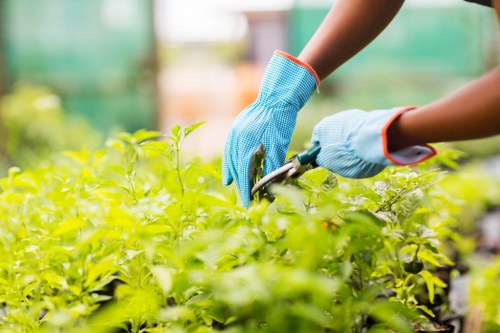
Introduction to Garden Maintenance
Maintaining a beautiful garden in Spitalfields requires dedication, knowledge, and the right set of tools. Whether you live in a historic townhouse or a modern apartment with a balcony garden, proper maintenance ensures your green spaces thrive throughout the year.
Garden maintenance involves a variety of tasks, from regular watering and pruning to seasonal planting and pest control. Understanding the unique climate and soil conditions of Spitalfields can help you tailor your garden care practices effectively.
With the right approach, you can transform your outdoor area into a serene oasis that enhances the aesthetic appeal of your home and provides a relaxing retreat from the hustle and bustle of city life.
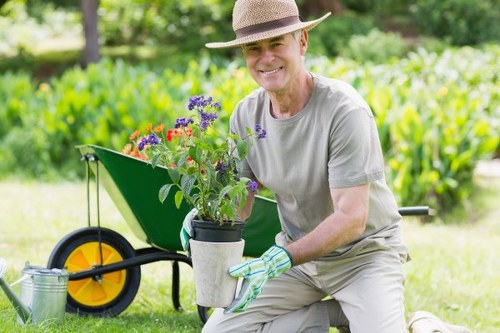
Essential Garden Maintenance Tasks
Regular Watering and Irrigation
Consistent watering is crucial for the health of your plants. In Spitalfields, the climate can be quite variable, so it’s important to adjust your watering schedule according to the weather conditions. Utilizing an efficient irrigation system can save time and ensure that your plants receive the right amount of moisture.
Tips for Effective Watering:
- Water early in the morning to reduce evaporation.
- Use drip irrigation to target the roots directly.
- Mulch your garden beds to retain soil moisture.
Proper watering techniques not only promote vigorous plant growth but also prevent common issues like root rot and fungal diseases.
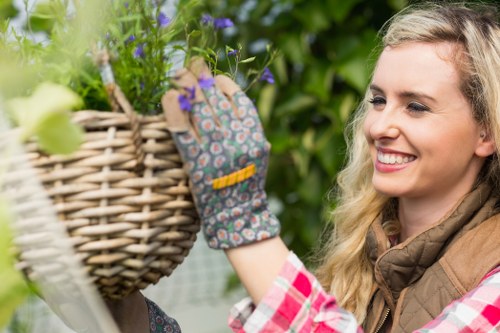
Pruning and Trimming
Pruning is essential for maintaining the shape and health of your plants. Regular trimming helps remove dead or diseased branches, encourages new growth, and ensures that plants receive adequate sunlight and air circulation.
Key Pruning Practices:
- Remove any dead or broken branches.
- Shape shrubs and hedges to your desired form.
- Thin out dense areas to improve airflow.
Proper pruning techniques can significantly enhance the appearance and longevity of your garden plants.
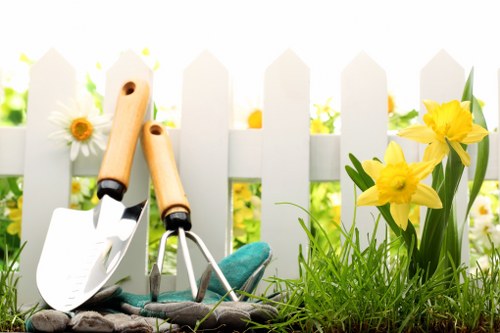
Seasonal Garden Care
Spring Maintenance
Spring is a critical time for garden maintenance in Spitalfields. As the weather warms up, it’s the perfect opportunity to prepare your garden for the growing season.
Spring Tasks:
- Clear away winter debris and dead plants.
- Apply compost or fertilizer to enrich the soil.
- Plant new flowers, vegetables, and shrubs.
Starting the season with these tasks sets the foundation for a vibrant and productive garden.
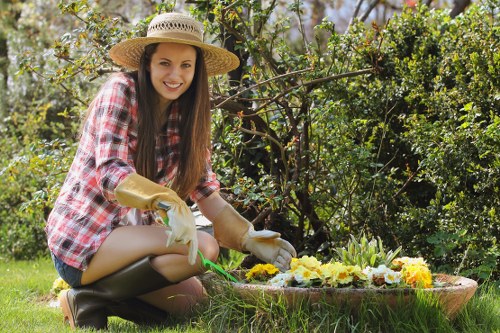
Summer Care
During the summer months, maintaining your garden involves managing heat stress and ensuring plants receive sufficient water.
Summer Tips:
- Monitor soil moisture levels regularly.
- Provide shade for sensitive plants.
- Control pests and diseases promptly.
Implementing these practices helps your garden withstand the summer heat and continue to flourish.
Autumn Preparation
As autumn approaches, it’s time to prepare your garden for the cooler months. This includes tasks like harvesting, mulching, and protecting plants from frost.
Autumn Activities:
- Harvest remaining fruits and vegetables.
- Add mulch to insulate plant roots.
- Prune perennials and remove spent flowers.
Proper autumn maintenance ensures that your garden remains healthy and resilient through the winter.
Tools and Equipment for Garden Maintenance
Essential Tools
Having the right tools is fundamental to effective garden maintenance. Investing in quality equipment can make tasks easier and more efficient.
- Pruning Shears: For precise trimming of branches and stems.
- Garden Hose with Adjustable Nozzle: Provides flexibility in watering.
- Rake and Shovel: Essential for soil preparation and debris removal.
Regularly maintaining your tools ensures they remain in good working condition and prolongs their lifespan.
Advanced Equipment
For larger gardens or more intensive maintenance, advanced equipment can be beneficial.
- Lawn Mower: Keeps your lawn neat and well-maintained.
- Leaf Blower: Efficiently clears leaves and debris.
- Compost Tumbler: Helps in creating rich compost for your garden.
Investing in these tools can enhance your garden maintenance routine and improve overall efficiency.
Eco-Friendly Garden Practices
Sustainable Gardening
Adopting eco-friendly practices in your garden not only benefits the environment but also promotes healthier plant growth.
- Composting: Recycles organic waste into nutrient-rich soil.
- Rainwater Harvesting: Conserves water and reduces utility costs.
- Native Plants: Require less water and are more resistant to local pests.
Implementing these sustainable practices contributes to a greener and more resilient garden.
Organic Pest Control
Managing pests organically helps maintain the balance of your garden’s ecosystem without harmful chemicals.
- Natural Predators: Encourage beneficial insects like ladybugs and bees.
- Neem Oil: An effective, non-toxic pesticide for various pests.
- Companion Planting: Planting certain species together can deter pests.
Using these methods ensures a healthy garden environment while minimizing the impact on beneficial wildlife.
Professional Garden Maintenance Services
Why Hire Professionals
While DIY garden maintenance can be rewarding, hiring professional services in Spitalfields offers numerous benefits.
- Expertise: Professionals have the knowledge to tackle complex gardening challenges.
- Time-Saving: Frees up your schedule for other activities.
- Customized Care: Tailored maintenance plans to suit your garden’s specific needs.
Opting for professional maintenance ensures your garden remains in top condition year-round.
Choosing the Right Service
Selecting a reliable garden maintenance service in Spitalfields involves considering factors like experience, reputation, and the range of services offered.
- Research local providers and read reviews.
- Evaluate their expertise in handling gardens similar to yours.
- Discuss your specific needs and preferences.
By carefully selecting a service provider, you can ensure that your garden receives the best possible care.
DIY Garden Maintenance Tips
Basic Maintenance Routines
For those who prefer a hands-on approach, establishing a regular maintenance routine is key to a thriving garden.
- Daily: Check for pests and ensure plants are hydrated.
- Weekly: Weed the garden beds and prune as necessary.
- Monthly: Fertilize plants and inspect for signs of disease.
Consistency in these routines helps maintain the health and beauty of your garden.
Gardening Hacks
Enhance your garden maintenance with these simple hacks:
- Use Coffee Grounds: Enrich the soil and deter pests.
- Repurpose Household Items: Utilize old containers for plant pots.
- Create DIY Compost: Reduce waste and produce natural fertilizer.
These creative solutions can make your gardening tasks more efficient and eco-friendly.
Plant Selection for Spitalfields Gardens
Choosing the Right Plants
Selecting plants that are well-suited to the Spitalfields climate and soil conditions is essential for a successful garden.
- Perennials: Provide long-term greenery with minimal maintenance.
- Annuals: Offer vibrant colors and seasonal variety.
- Shrubs and Trees: Add structure and height to your garden landscape.
Consider factors like sunlight exposure, space, and water requirements when choosing plants.
Seasonal Flowering Plants
Incorporate seasonal flowering plants to ensure continuous blooms throughout the year.
- Spring: Tulips, daffodils, and crocuses.
- Summer: Roses, lavender, and sunflowers.
- Autumn: Chrysanthemums, asters, and marigolds.
These flowers not only enhance the visual appeal but also attract beneficial pollinators to your garden.
Maintaining Garden Health
Soil Care and Fertilization
Healthy soil is the foundation of a thriving garden. Regular soil testing helps determine nutrient levels and pH balance, allowing you to amend the soil accordingly.
- Adding Compost: Improves soil structure and fertility.
- Using Organic Fertilizers: Promote sustainable plant growth.
- Mulching: Retains moisture and suppresses weeds.
Maintaining optimal soil conditions ensures that your plants can absorb the nutrients they need to grow robustly.
Pest and Disease Management
Protecting your garden from pests and diseases is crucial for maintaining plant health.
- Regular Inspections: Catch issues early before they spread.
- Integrated Pest Management (IPM): Combines biological, cultural, and chemical methods.
- Healthy Plant Practices: Strong, healthy plants are more resistant to diseases.
Effective pest and disease management helps sustain a vibrant and healthy garden ecosystem.
Enhancing Garden Aesthetics
Design and Layout
A well-designed garden layout enhances both functionality and visual appeal. Consider the following elements when planning your garden design:
- Pathways: Create clear and aesthetically pleasing routes through your garden.
- Plant Grouping: Arrange plants in clusters for a lush, full appearance.
- focal Points: Incorporate features like fountains, statues, or seating areas.
Thoughtful design choices can transform your garden into a harmonious and inviting space.
Lighting and Decorations
Incorporating lighting and decorative elements adds charm and functionality to your garden.
- Solar Lights: Eco-friendly option for illuminating pathways and features.
- Garden Sculptures: Add artistic flair and personal touch.
- Outdoor Furniture: Provides comfortable spaces to enjoy your garden.
These enhancements not only beautify your garden but also extend its usability into the evening hours.
Sustainable Practices for Long-Term Maintenance
Water Conservation
Implementing water conservation strategies ensures sustainable garden maintenance and reduces your environmental footprint.
- Rainwater Harvesting Systems: Collect and store rainwater for garden use.
- Drought-Resistant Plants: Choose species that require less water.
- Efficient Irrigation: Use timers and smart controllers to optimize water usage.
These practices contribute to a more sustainable and resilient garden ecosystem.
Organic Gardening
Adopting organic gardening methods promotes environmental health and produces safer, chemical-free plants.
- Natural Fertilizers: Use compost, manure, and other organic materials.
- Biological Pest Control: Introduce beneficial insects to manage pests naturally.
- Crop Rotation: Prevents soil depletion and reduces disease incidence.
Organic practices lead to healthier plants and a more balanced garden ecosystem.
Community and Garden Resources in Spitalfields
Local Gardening Groups
Joining local gardening groups in Spitalfields provides access to valuable resources, knowledge, and support.
- Workshops and Seminars: Learn new techniques and trends in garden maintenance.
- Plant Swaps: Exchange plants and seeds with fellow gardeners.
- Community Projects: Participate in local garden beautification initiatives.
Engaging with the community enhances your gardening experience and fosters a sense of camaraderie.
Local Suppliers and Nurseries
Accessing local suppliers and nurseries in Spitalfields ensures you obtain high-quality plants and gardening supplies tailored to your region.
- Plant Variety: Wide selection of native and adapted species.
- Expert Advice: Knowledgeable staff can guide your plant selections and care strategies.
- Quality Products: Reliable sources for tools, fertilizers, and other essentials.
Supporting local businesses contributes to the sustainability and vibrancy of the Spitalfields gardening community.
Conclusion
Maintaining a garden in Spitalfields is a rewarding endeavor that combines creativity, effort, and knowledge. By understanding the unique challenges and opportunities of the local environment, you can cultivate a thriving garden that enhances your living space and contributes to the community's green landscape.
Whether you choose to maintain your garden yourself or enlist the help of professional services, the key to success lies in consistent care, adaptability, and a passion for gardening.
Ready to transform your garden? Contact us today to book your garden maintenance service in Spitalfields and enjoy a lush, vibrant outdoor space all year round.